DECEMBER
2011/2: DOWNLOAD ROUNDUP
Brian Wilson
The previous roundup - December 2011/1 - is
available here.
The index to all earlier roundups is here.
Download
of the Month
Havergal BRIAN (1876-1972)
Symphony No. 1 in d minor The Gothic (1919-27) [106:07]
Susan Gritton (soprano), Christine Rice (mezzo), Peter Auty
(tenor), Alastair Miles (bass), The Bach Choir, BBC National
Chorus of Wales, Brighton Festival Chorus, Côr Caerdydd,
CBSO Youth Chorus, Eltham College Boys’ Choir, Huddersfield
Choral Society, London Symphony Chorus, Southend Boys’
and Girls’ Choirs
BBC National Orchestra of Wales; BBC Concert Orchestra/Martyn
Brabbins
rec. live, 17 July 2011, Royal Albert Hall, London
HYPERION CDA67971/2 [54:07 + 60:41] – from hyperion-records.co.uk
(mp3 and lossless)
[‘This recording of The Gothic is very good indeed
– the best yet – and captures a sensational amount
of detail in a performance that resets the clock. Hyperion have
done us proud. The only jangling note is the cover which just
isn’t Hyperion but everything else is "comme il faut".
Recording of the Month. See review
by Rob Barnett and Christopher Gunning’s review
of the concert.]
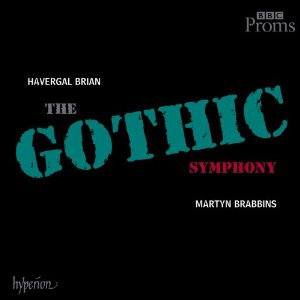 I
gave this a brief review at the end of the previous Roundup.
Since then its value as a download has been increased by Hyperion’s
decision to make the final nine minutes of applause free of
charge, thereby reducing the download price to £12.49
in all three formats, mp3, flac or alac.
I
gave this a brief review at the end of the previous Roundup.
Since then its value as a download has been increased by Hyperion’s
decision to make the final nine minutes of applause free of
charge, thereby reducing the download price to £12.49
in all three formats, mp3, flac or alac.
What a bold move to set your career in motion with a first symphony
that outdoes Beethoven’s Ninth and Mahler’s Eighth,
the ‘Symphony of a Thousand’, in size and scope and,
like them, includes a long choral movement, in this case setting
the Te Deum. The quotation from Goethe’s Faust
on the title page even seems to force us to make the Mahler
connection. I know the result isn’t everyone’s cup
of tea, and it’s not music to which I yearn to return on
a regular basis, but neither are the two better-known works
that I’ve mentioned. An occasional visit to any of the
three is invigorating and Martyn Brabbins and his team have
given us the ideal way to do it.
The booklet contains forewords by Martyn Brabbins and Roger
Wright, controller of Radio 3 and an informative note from Calum
MacDonald. The translation of the Te Deum is much more
accurate than the version in the Book of Common Prayer but its
pedestrianism serves to remind us of the glory of Cranmer’s
prose.
Recording the work must have been almost as monumental an achievement
as this, the first of his 32 symphonies, was for Brian himself.
I understand that Hyperion had their eye on recording the work
at the Proms, or at least using the BBC’s own recording,
for months in advance. In the event they had to make do with
editing the BBC recording – good as that was, the time
and effort taken have clearly resulted in a great improvement
on the broadcast.
I listened on the night in DAB on the same set-up in my study
which I use as my primary system for reviewing purposes. The
Arcam Solo at the heart of that system has both DAB and FM tuners.
I normally listen during the day in DAB to be in sync with the
Pure Radio in the kitchen and forgot to change the aerial –
just about my only criticism of the Solo is its one aerial input:
to change from your DAB to your FM aerial you need to unscrew
the fiddly F-connector and screw on the other aerial, which
I didn’t do in time for the broadcast. Radio 3 in 192 kb/s
DAB is no match for Hyperion’s lossless download, which
is superb.
There have been earlier, pioneering recordings: Marco Polo’s
was valuable as more than a stop-gap and it’s held the
field for a long time now – reissued on Naxos 8.557418/9
and available for download in mp3 from classicsonline.com.
The booklet comes with the deal and the download is less expensive
than the Hyperion, but the new performance is more effective
and the Hyperion download, in lossless as well as mp3, is superior.
The 1966 Boult performance remains available on Testament
SBT21454: there’s an 11:30 excerpt on YouTube here.
Geoff Molyneux has also been listening to the Gothic:
This new recording from the 2011 Proms of Havergal Brian’s
Gothic Symphony is a fantastic achievement and great
credit must go to all concerned with its production. Much has
already been written about this work so I will just make a few
comments on the music and the performance.
What a fearsome, dramatic and arresting beginning, warlike and
cataclysmic in tone. But after only one minute, the mood suddenly
changes as a peaceful and reflective melody for a solo violin
is introduced. This section, with its harp and wind accompaniment
seems reminiscent of early Schoenberg, and we already seem to
be embarking on a journey through unrelated and different styles
of music. There is so much that is really imaginative in Brian’s
work, many strokes of genius, for example the organ entry a
few bars from the end of the movement. Like Mahler, Brian is
able to produce chamber music quality amidst all this noisy
and often stormy music.
The second movement begins slowly but ominously at a moderate
tempo with a Wagnerian sense of doom. There are one or two moments
when I feel that I am in Niebelheim! There is plenty of opportunity
for individual instruments to shine, and we hear some beautiful
playing from cor anglais, bassoon and double bassoon. As in
the first movement, we are subjected to some stormy, violent
and powerful music, but after some almost Messiaen-like rhythmic
chords the music subsides to more gentle chording, and the movement
concludes with the softest imaginable sound from a lone bass
clarinet.
In movement 3 Bruckner is instantly recognisable, but not for
long. The momentum is abruptly lost as we move into quiet music.
Equally suddenly, a more violent passage ensues until a solo
violin calms things down. Then we have a short-lived Straussian
section, so this is music of sudden and unexpected contrasts.
What an extraordinary sound towards the end with some crazy
xylophone music with weird and wonderful accompaniment.
The fourth movement has some very complex music, so much so
that there are passages where the texture is so dense it is
fortunate that we already know the text of the Te Deum,
[it’s in the booklet if you don’t: BW] because
there is no chance of hearing the words. But these are contrasted
with almost simplistic, tonal brass fanfares and single melodic
lines and homophonic passages where the text stands out loud
and clear.
Similarly, movements five and six are hugely complex at times
with so much going on that it becomes impossible to hear anything
other than a muddy mess. Then all of a sudden there comes a
very simple passage where I can hear everything. The extraordinary
vocal la, la, la section is very telling and imaginative, especially
after so much frightening music.
Movement six begins with a beautifully played oboe d’amore
melody and this recurs later. I am not so keen on Peter Auty’s
rather strained sounding tenor, but Susan Gritton and Alastair
Miles are excellent in this movement. Once again there is a
huge mixture of styles with lots of detailed interest. The huge
orchestral crescendos leading to the vocal entries at non confundar
must be amongst the most shattering in all music.
The recording copes magnificently with the colossal sound produced
here, but we can also made aware so clearly of all the strands
of counterpoint in real detail in the more contrapuntal passages.
We can for example appreciate much beautiful playing from individual
woodwind players as well as lovely and sensitive, well-balanced
chording from the brass. Great credit is due to the sound engineers
for such an achievement.
The Gothic Symphony is a great curiosity rather than
a great work, full of original ideas and certainly worth an
occasional airing, but I think there is also much unmemorable
music here and the violent contrasts in mood and style seem
to build a very incoherent whole. Brian is an undoubted master
of orchestration and vocal writing in a wide variety of styles.
He produces occasional passages of great interest and beauty.
I am often reminded of other composers as the work progresses,
and suggestions and touches of Bruckner, Mahler, Holst, Strauss,
Delius and many others abound. What is so extraordinary is the
prophetic nature of things to come in Brian’s music. For
example, in the vocal sections, sometimes he seems to be anticipating
Britten, Tippett and Walton.
This music is vast in scale and all involved have produced a
performance and recording which may never be bettered. I am
not sure that I will listen to it very often though. Unlike
the composers mentioned above, this is music I can happily live
without but with perhaps just an occasional airing.
Geoffrey Molyneux
The latest, second volume in Toccata’s series of Havergal
Brian’s Orchestral Music, music from his operas, is
now available on TOCC0113 [70:55]: download in mp3 from
toccataclassics.com
and soon, I presume, from classicsonline.com and Naxos Music
Library. The comprehensive booklet of notes is available with
the purchase. The music is quite different from the Gothic
but these Toccata releases are also important. I’ve had
time for only one quick but enjoyable run-through, so I’ll
reserve my detailed comments for next time.
Discovery
of the Month
Wilhelm STENHAMMAR (1871-1927)
Piano Concertos Nos. 1 and 2
Piano Concerto No.2 in d minor, Op.23 (1907) [25:52]
Piano Concerto No. 1 in b flat minor, Op.1 (1893/4) [42:02]
Niklas Sivelöv (piano)
Malmö Symphony Orchestra/Mario Venzago – rec. August
2009. DDD
Pdf booklet included.
NAXOS 8.572259 [67:57] – from classicsonline.com
(mp3)
The Romantic Piano Concerto series, Vol. 49
Piano Concerto No. 1 in b flat minor, Op.1 (1893/4) [45:53]
Piano Concerto No. 2 in d minor, Op.23 (1907) [29:21]
Seta Tanyel (piano)
Helsingborg Symphony Orchestra/Andrew Manze – rec.2008.
DDD.
Pdf booklet included
HYPERION CDA67750 [75:16] – from hyperion-records.co.uk
(mp3 and lossless)
[‘Two leonine concertos of the Scandinavian romantic persuasion
ready not merely to enchant but also to impress with their epic
mien. They stand as companions for the first time on a single
freestanding disc. A logical choice in performances of total
engagement.’ See review
of the Hyperion by Rob Barnett.
‘This is highly engaging music, with both concertos worthy
of a place in the concert hall, and this disc will, I hope,
help the cause. It is an outstanding achievement which more
than meets Hyperion’s demandingly high standard.’
See review
by Christopher Fifield.]
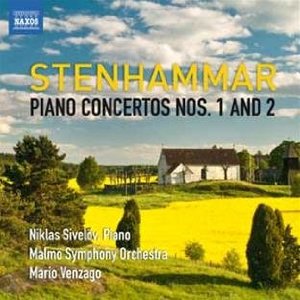
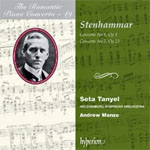 Until
now Stenhammar has been on the fringes of my musical radar without
really registering. Though I was aware of the existence of the
Hyperion recording and my colleagues’ recommendations,
I’d never got round to hearing it; it took the Naxos recording
– one of founder-chairman Klaus Heymann’s recent personal
recommendations – to make me listen.
Until
now Stenhammar has been on the fringes of my musical radar without
really registering. Though I was aware of the existence of the
Hyperion recording and my colleagues’ recommendations,
I’d never got round to hearing it; it took the Naxos recording
– one of founder-chairman Klaus Heymann’s recent personal
recommendations – to make me listen.
I don’t like playing the direct comparison game too much,
but on this occasion I listened to the first movement of the
Naxos version of the First Concerto immediately after the Hyperion.
Overall the new recording takes more than a minute less than
the older one – not a huge difference in around 15-minutes,
but the new version sounds much lighter than its predecessor.
There’s a gain in lyricism and a loss of power, so it’s
effectively swings and roundabouts. I could live with either,
though my personal preference for the greater power of the Hyperion
recording is supported by the fact that Mats Widlund and Gennady
Rozhdestvensky on Chandos and Love Derwinger and Paavo Järvi
on BIS
or Brilliant
– see below – both agree almost to the second with
the Hyperion timing.
Heard separately, without attempting to make detailed comparisons,
I’m more than happy with either. If you must have lossless,
you will have to choose the Hyperion. Even if and when eclassical.com
release the Naxos in lossless sound, their per-second price
is likely to make the download more expensive than the CD for
UK purchasers, for whom Naxos is a budget label.
There are also two BIS recordings, less logically coupling each
of the concertos with other Stenhammar works. These are available
to download in mp3 and lossless sound from eclassical.com (BIS-CD-550
– here
and BIS-CD-476 – here.
There is also a Chandos recording of the First Concerto, with
the fragmentary Third Symphony, available in mp3 and lossless
downloads from theclassicalshop.net (CHAN9074 – here).
Reissue
of the Month
Engelbert HUMPERDINCK (1853-1921)
Hänsel und Gretel
Elisabeth Grümmer (mezzo) – Hansel; Elisabeth Schwarzkopf
(soprano) – Gretel; Else Schürhoff (mezzo) –
The Witch; Maria von Ilosvay (mezzo) – Mother; Josef Metternich
(baritone) – Father; Anny Felbermayer (soprano) –
Sandman, Dew Fairy; Loughton High School for Girls Choir; Bancroft
School Choir
Philharmonia Orchestra/Herbert von Karajan – rec. 1953.
ADD/mono
EMI CLASSICS 5099964071657 [108:07] – from classicsonline.com
(mp3) or stream from Naxos Music Library
[‘To describe Karajan’s Hänsel und Gretel
as the benchmark recording is almost to state the obvious.
Its quality, both in terms of the performance and the recording,
more than justify that status, and its perennial place in the
catalogue may well explain why so few competitors have appeared
in the intervening almost sixty years.’ – see review
by Gavin Dixon]
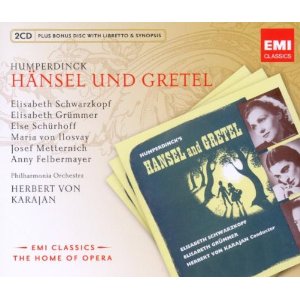
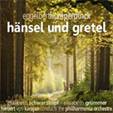 What
can I say about this recording that hasn’t already been
said, most recently by Gavin Dixon? Other versions come and
go: the fairly recent Tate recording (also EMI) seems to have
disappeared, though classicsonline.com offer the highlights
on Encore. This is the classic Hänsel und Gretel
and likely to remain in the catalogue in one form or another
as long as classical music exists. What I especially like is
the way that all concerned contrive to balance the Wagnerian
elements with the underlying good humour of the music –
listen to the opening of Act II, which at times sounds like
the entry of Fasolt and Fafner in Rheingold but with
an un-Wagnerian lightness of rhythm bubbling below the surface.
What
can I say about this recording that hasn’t already been
said, most recently by Gavin Dixon? Other versions come and
go: the fairly recent Tate recording (also EMI) seems to have
disappeared, though classicsonline.com offer the highlights
on Encore. This is the classic Hänsel und Gretel
and likely to remain in the catalogue in one form or another
as long as classical music exists. What I especially like is
the way that all concerned contrive to balance the Wagnerian
elements with the underlying good humour of the music –
listen to the opening of Act II, which at times sounds like
the entry of Fasolt and Fafner in Rheingold but with
an un-Wagnerian lightness of rhythm bubbling below the surface.
Make sure that you download the version to which I’ve given
the link, at £8.99: there’s an earlier EMI Great
Recordings alternative at almost twice the price.
There’s a most inexpensive alternative from Past Classics
which can be downloaded from emusic.com for just £1.26
or less – here.
The transfer isn’t made with the same care as the latest
EMI version but I have to admit that it’s not bad: there’s
even a degree less hiss, I presume as a result of a treble cut.
Each act is complete on one track, too, from Past Classics,
thus avoiding any glitches between tracks. It’s almost
impossible to listen to the Naxos Music Library version of the
EMI because of the gaps which the player inserts between tracks.
It’s easier to burn the Past Classics version to an mp3
CD, too, for use in the car, or sync to your mp3 player –
again, one act per track eliminates gaps.
The EMI sounds incredibly good for its age but the Past Classics
is far more than tolerable. Neither comes with a libretto, but
you shouldn’t have trouble finding one online. Why cannot
download providers also offer the bonus CD with the libretto
which is now fairly standard fare with EMI Classics operas?
Freebie
of the Month
A Christmas celebration
Includes: Ding dong merrily on high; Kwmbayah; Joys seven; William
JAMES An Australian Christmas; Santa Claus-Trophia
(arr. Sandy SMITH); William
MATHIAS Sir Christemas and A Christmas Fantasy (arr
Gordon LANGFORD).
Huddersfield Choral Society; Sellers Engineering Band/Brian
Kay, Philip McCann
Pdf booklet with texts included.
CHANDOS BRASS CHAN4530 [70:40] – from
theclassicalshop.net (mp3 and lossless)
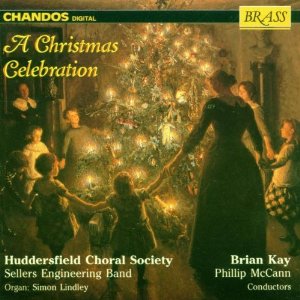
 This
was the recent free download from the Chandos Classicalshop
Newsletter. Even if you missed it, the mp3 download costs a
mere £4.80, with lossless only a little more at £4.99.
You’ve probably already guessed from the list of participants
that this is an excellent collection of its kind and the recording,
from 1993, is good. Even the one item arranged by John Rutter
– Bach’s Zion hears the watchmen’s voices
from Cantata 140 – is guaranteed not to upset his detractors
unduly. The arrangement of Away in a manger is rather
twee, however. There’s one typo in the texts – Heiliger
Nacht (twice!) should be Heilige Nacht – wrong
grammatical gender. If you haven’t yet signed up for the
Newsletter, why not do so now?
This
was the recent free download from the Chandos Classicalshop
Newsletter. Even if you missed it, the mp3 download costs a
mere £4.80, with lossless only a little more at £4.99.
You’ve probably already guessed from the list of participants
that this is an excellent collection of its kind and the recording,
from 1993, is good. Even the one item arranged by John Rutter
– Bach’s Zion hears the watchmen’s voices
from Cantata 140 – is guaranteed not to upset his detractors
unduly. The arrangement of Away in a manger is rather
twee, however. There’s one typo in the texts – Heiliger
Nacht (twice!) should be Heilige Nacht – wrong
grammatical gender. If you haven’t yet signed up for the
Newsletter, why not do so now?
I’ve already mentioned Damian’s 78s in earlier
Roundups. It’s recently had something of a facelift: you
may wish to check out recent additions – here.
Christmas Music Collections – familiar and unfamiliar
LIBERA: The Christmas Album
Joy to the World
Still, still, still
Carol of the Bells
Veni, Veni Emmanuel
Once in Royal David’s City
O Holy Night
White Christmas
Corpus Christi Carol
In Dulci Jubilo
Have Yourself a Merry Little Christmas
Sing the Story
Coventry Carol
The First Nowell
Jubilate DeoWhile Shepherds watched their Flocks
Lullabye (Goodnight my angel)
Libera/Robert Prizeman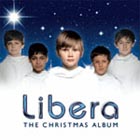
EMI CLASSICS 0886352 [57:21]
 This
is being touted as the thing this Christmas. It’s
very well done and I’m sure that it will sell like hot
cakes, but 57 minutes of angelic voices singing director Robert
Prizeman’s Karl Jenkins-like arrangements was more than
enough for me. It’s available from streaming from the Naxos
Music Library, but not yet as a 320 kb/s download from their
sister site, classicsonline.com. Amazon.co.uk have it in (I
assume) 256kb/s mp3 here
and hmvdigital.com in 320kb/s here.
This
is being touted as the thing this Christmas. It’s
very well done and I’m sure that it will sell like hot
cakes, but 57 minutes of angelic voices singing director Robert
Prizeman’s Karl Jenkins-like arrangements was more than
enough for me. It’s available from streaming from the Naxos
Music Library, but not yet as a 320 kb/s download from their
sister site, classicsonline.com. Amazon.co.uk have it in (I
assume) 256kb/s mp3 here
and hmvdigital.com in 320kb/s here.
Carols From King’s
On Christmas Night, ‘Sussex Carol’ (arr. D. WILLCOCKS)
[1:56] And All In the Morning [2:17]
Tomorrow Shall Be My Dancing Day (arr. D. WILLCOCKS)
[1:53]
Weihnachtslieder, Op.8/3. Die Könige (Sung in English)
(arr. I. ATKINS) [2:43]
The Cherry-Tree Carol (arr. D. WILLCOCKS) [1:48]
All My Heart this Night Rejoices [2:02]
Silent Night (arr. D. WILLCOCKS) [3:05]
Hail! Blessed Virgin Mary [2:15]
It Came upon the Midnight Clear (arr. D. WILLCOCKS) [3:32]
Ding Dong! Merrily On High [2:21]
I Saw a Maiden [3:05]
In the Bleak Mid-Winter [4:34]
Mary Walked Through a Wood of Thorn [1:38]
The Lord at First did Adam Make (arr. D. WILLCOCKS) [3:14]
A Child is Born in Bethlehem [2:31]
A Babe Is Born I Wys [2:23]
Psallite unigenito [1:01]
While Shepherds Watched their Flocks by Night (arr. D. WILLCOCKS)
[2:51]
Nowell! Nowell! Nowell! [1:50]
The Holly and the Ivy [3:49]
Angelus ad virginem [1:23]
Angelus ad virginem (arr. E. POSTON) [2:38]
I Sing of a Maiden [2:43]
Watt’s Cradle Song [2:55]
Tomorrow Shall Be My Dancing Day [2:05]
Sing a Song of Joy [1:49]
Jesus Christ the Apple Tree [2:31]
Most Glorious Lord of Life [2:29]
That Lord that lay in asse Stall [1:33]
Where Riches is everlastingly [2:51]
Stephen Varcoe (baritone); Choir of King’s College, Cambridge/Sir
David Willcocks
EMI CLASSICS FOR PLEASURE 0724358562156 [73:45] –
from classicsonline.com
(mp3)
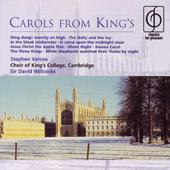
 If
you don’t have this self-recommending collection, or something
like it, this is your essential purchase – a generous and
comprehensive mix of the familiar and less familiar available
for the budget price of £3.99. David Willcocks’ reign
at King’s may have been well in the past but he left his
successors such a firm base on which to build that his predecessor,
Boris Ord, is now almost forgotten, though his time, too, was
very distinguished, as witness the Beulah Extra reissue of his
recording of Orlando Gibbons’ This is the Record of
John and other anthems (1BX20 – see July 2010
Roundup).
The recordings still sound fresh.
If
you don’t have this self-recommending collection, or something
like it, this is your essential purchase – a generous and
comprehensive mix of the familiar and less familiar available
for the budget price of £3.99. David Willcocks’ reign
at King’s may have been well in the past but he left his
successors such a firm base on which to build that his predecessor,
Boris Ord, is now almost forgotten, though his time, too, was
very distinguished, as witness the Beulah Extra reissue of his
recording of Orlando Gibbons’ This is the Record of
John and other anthems (1BX20 – see July 2010
Roundup).
The recordings still sound fresh.
Carols from Oxford
Come All You Worthy Gentlemen [1:24]
Nova, Nova, Ave fit ex Eva [1:20]
Goday My Lord Syre Cristemasse [1:47]
Peter Maxwell DAVIES Ave
Maria: Hail Blessed Flower [1:39]
Anthony MILNER Out of your
sleep arise and wake [2:00]
Coventry Carol: Lully, Lulla, Thou Little Tiny Child (version
2) [3:16]
Thomas RAVENSCROFT Melismata
1611: Remember, O Thou Man [2:59]
William BYRD Lullaby, my
sweet little baby [4:33]; This day Christ was born [2:53]
As Jacob with travel was weary one day, ‘Jacob’s Ladder’
[2:21]
The First Nowell [4:34]
Henry Thomas SMART Why,
most highest? (Jesus in the Manger) [2:37]
Joseph BARNBY The virgin
stills the crying [2:17]
Moon Shines Bright [2:04]
I Saw Three Ships [1:57]
What Child is this? (Greensleeves) [2:05]
See Amid the Winter’s Snow [4:49]
John Bacchus DYKES Sleep,
Holy Babe [3:45]
Good Christian men, rejoice [1:45]
Good King Wenceslas [2:39]
A Babe is born [2:16]
Arthur SULLIVAN All this
night [2:14]
Wassail Song, ‘Here We Come A-Wassailing’ [2:18]
John Henry HOPKINS We Three
Kings of Orient are [3:40]
Benjamin BRITTEN Friday
Afternoons, Op.7/5: A New Year Carol [2:13]
Patrick HADLEY I Sing of
a Maiden [2:36]
Gustav HOLST Lullay My Liking,
Op. 34/2, H. 129 [3:04]; Of one that is so fair, Op. 34/3, H.
130 [1:34]; This have I done for my true love, Op. 34/1, H.
128 [4:47]
Choir of Magdalen College, Oxford/John Harper
MUSICAL CONCEPTS MCS-ED-9085 [77:26] – from classicsonline.com
(mp3) or stream from Naxos Music Library
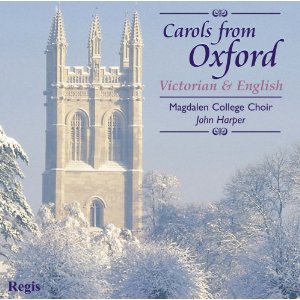
 This
Oxford offering costs £1 more than its Cambridge rival
– isn’t that as it should be, with the older seat
of learning commanding a higher price? Actually, setting personal
prejudice apart – and I have included far more Cambridge-sourced
material in this selection – this varied and attractive
selection is well worth £4.99 of anyone’s money.
Apart from a noticeable background rumble (from passing traffic?)
the recording is fine.
This
Oxford offering costs £1 more than its Cambridge rival
– isn’t that as it should be, with the older seat
of learning commanding a higher price? Actually, setting personal
prejudice apart – and I have included far more Cambridge-sourced
material in this selection – this varied and attractive
selection is well worth £4.99 of anyone’s money.
Apart from a noticeable background rumble (from passing traffic?)
the recording is fine.
Also at £4.99, with Bill Ives conducting the Magdalen
College Choir on The Gift of Music (CCLCDG1099 [67:04]
– from classicsonline.com
in mp3) there’s a recording of Nine Lessons and Carols,
an attractive and inexpensive alternative to the King’s
version.
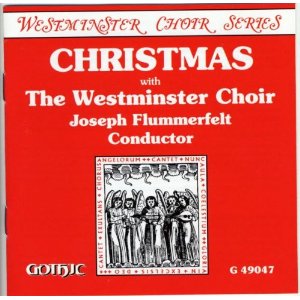
 Two
albums from the many Christmas offerings on the Gothic
label. Christmas with the Westminster Choir with members
of the Concerto Soloists of Philadelphia, conducted by Joseph
Flummerfelt from 1991 (G-49047 [55:41] from classicsonline.com
(mp3) or stream from Naxos Music Library) is pretty well
what you’d expect from a concert with an able group of
singers and accompanists performing slightly, but not offensively,
souped-up arrangements. The cowboy carol I wonder as I wander
sounds too refined but O come Emmanuel with accompaniment
is the only really irksome item in an enjoyable collection which
is suitable for listening to while enjoying the mince pies and
mulled wine. The recording is good. This album comes complete
with the booklet of texts.
Two
albums from the many Christmas offerings on the Gothic
label. Christmas with the Westminster Choir with members
of the Concerto Soloists of Philadelphia, conducted by Joseph
Flummerfelt from 1991 (G-49047 [55:41] from classicsonline.com
(mp3) or stream from Naxos Music Library) is pretty well
what you’d expect from a concert with an able group of
singers and accompanists performing slightly, but not offensively,
souped-up arrangements. The cowboy carol I wonder as I wander
sounds too refined but O come Emmanuel with accompaniment
is the only really irksome item in an enjoyable collection which
is suitable for listening to while enjoying the mince pies and
mulled wine. The recording is good. This album comes complete
with the booklet of texts.
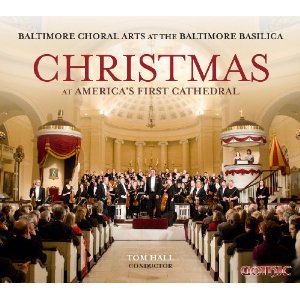
 Christmas
at America’s First Cathedral features Baltimore Choral
Arts conducted by Tom Hall at Baltimore’s Basilica (Gothic
G-49277 [58:10] – from classicsonline.com
(mp3) or stream from Naxos Music Library). This offers a
varied and unhackneyed programme, opening with an excerpt from
Mendelssohn’s Paulus, centring on Rejoice
O Judah from Judas Maccabæus, and concluding
with the Halleluiah Chorus from Messiah, all delivered
in rousing fashion, and including six attractive première
recordings. Professional quality performances in a good recording.
I hadn’t realised that this (RC) Metropolitan Cathedral
predates the (Episcopal) National Cathedral in Washington by
a considerable margin. This time there are no texts, or even
a shot of the back cover, but the list of works and brief notes
are available from the Gothic web page here.
Christmas
at America’s First Cathedral features Baltimore Choral
Arts conducted by Tom Hall at Baltimore’s Basilica (Gothic
G-49277 [58:10] – from classicsonline.com
(mp3) or stream from Naxos Music Library). This offers a
varied and unhackneyed programme, opening with an excerpt from
Mendelssohn’s Paulus, centring on Rejoice
O Judah from Judas Maccabæus, and concluding
with the Halleluiah Chorus from Messiah, all delivered
in rousing fashion, and including six attractive première
recordings. Professional quality performances in a good recording.
I hadn’t realised that this (RC) Metropolitan Cathedral
predates the (Episcopal) National Cathedral in Washington by
a considerable margin. This time there are no texts, or even
a shot of the back cover, but the list of works and brief notes
are available from the Gothic web page here.
Joy to the World
Rise up, shepherd, and follow [2:40]
Gabriel’s message [2:43]
Noël nouvelet [2:25]
What child is this? [3:17]
Pyotr Ilyich TCHAIKOVSKY The
crown of roses [3:06]
Arr. Johann Sebastian BACH O
little one sweet [2:17]
Lullay my liking [4:25]
Stille Nacht [3:22]
The quiet heart [2:29]
John RUTTER There is a flower
[3:43]
Joy to the world [2:32]
Camille SAINT-SAËNS
Sérénade d’hiver [5:17]
The twelve days of Christmas [9:02]
Gaudete [1:37]
God rest you merry gentlemen [2:57]
The little drummer boy [2:45]
James Lord PIERPONT Jingle
bells [1:30]
Deck the hall with boughs of holly [2:29]
Pdf booklet with texts included
The King’s Singers – rec. live, December 2010. DDD.
SIGNUM SIGCD268 [58:38] – from classicsonline.com
(mp3) or stream from Naxos Music Library
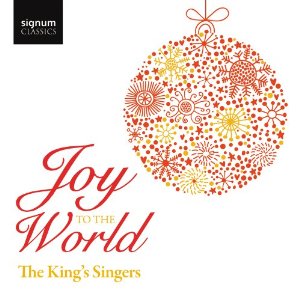
 Fans
of the King’s Singers’ close harmony cannot go wrong
with their first Christmas album since the release of SIGCD502
in 2003, recorded last December at Cadogan Hall, London. This
hour-long selection from their concert is about the right length
for me. The King’s Singers are rather like a box of expensive
Belgian chocolates – very satisfying in small doses but
a bit cloying after a while. John Julius Norwich’s additions
to Twelve Days of Christmas are amusing once, perhaps
even twice, but, unlike the great Hoffnung or Bob Newhart, they
don’t bear repetition. The mp3 recording is good; as yet
eclassical.com, who offer Signum in lossless as well as mp3,
but you may find that it appears there before Christmas.
Fans
of the King’s Singers’ close harmony cannot go wrong
with their first Christmas album since the release of SIGCD502
in 2003, recorded last December at Cadogan Hall, London. This
hour-long selection from their concert is about the right length
for me. The King’s Singers are rather like a box of expensive
Belgian chocolates – very satisfying in small doses but
a bit cloying after a while. John Julius Norwich’s additions
to Twelve Days of Christmas are amusing once, perhaps
even twice, but, unlike the great Hoffnung or Bob Newhart, they
don’t bear repetition. The mp3 recording is good; as yet
eclassical.com, who offer Signum in lossless as well as mp3,
but you may find that it appears there before Christmas.
There are two of his compositions/arrangements on Joy to
the World, but for fans of John
Rutter – yes, I know you either love his music
or you hate it – I list four of his recordings with the
Cambridge Singers on the Collegium label. Inevitably there’s
some overlap – In dulci jubilo, for example, in
Christmas Night and The Cambridge Singers Christmas
Album – but much less than you may imagine. I tried
some in lossless sound from eclassical.com and some in (good)
mp3 from classicsonline.com: both sound fine.
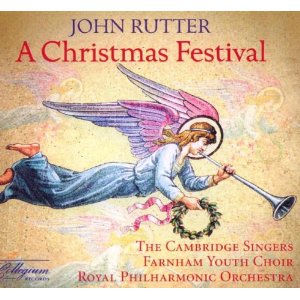
 A
Christmas Festival combines the Cambridge Singers with
Elin Manahan Thomas, Clara Sanabras (sopranos), Melanie Marshall
(mezzo), the Farnham Youth Choir and the Royal Philharmonic
Orchestra, recorded in the Cadogan Hall, London, in 2008, on
COLCD133 [71:45]. Most of the music is arranged or orchestrated
in lush fashion by Rutter and includes pretty standard fare
from O come, all ye faithful on track 1 to Have yourself
a merry little Christmas on the final track, no.20. Eclassical.com
offer mp3 and lossless for $12.92 – here
– but classicsonline.com (£7.99, mp3 only - here)
include the booklet with the deal. The booklet can also be accessed
via Naxos Music Library.
A
Christmas Festival combines the Cambridge Singers with
Elin Manahan Thomas, Clara Sanabras (sopranos), Melanie Marshall
(mezzo), the Farnham Youth Choir and the Royal Philharmonic
Orchestra, recorded in the Cadogan Hall, London, in 2008, on
COLCD133 [71:45]. Most of the music is arranged or orchestrated
in lush fashion by Rutter and includes pretty standard fare
from O come, all ye faithful on track 1 to Have yourself
a merry little Christmas on the final track, no.20. Eclassical.com
offer mp3 and lossless for $12.92 – here
– but classicsonline.com (£7.99, mp3 only - here)
include the booklet with the deal. The booklet can also be accessed
via Naxos Music Library.
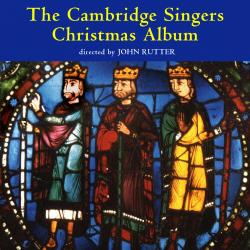
 The
Cambridge Singers Christmas Album (CSCD512 [75:33]
– rec. 1989, 1993 and 2003) contains a mixture, with some
rather less familiar items, mostly sung a cappella, so those
who dislike Rutter’s orchestrations need have no qualms;
even the orchestral items are not in Rutter’s own arrangements.
The City of London Sinfonia accompany Quel est cet odeur?
Berlioz’s Shepherds’ Farewell, Handel’s
Unto us a Child is born and a fine version of the Vaughan
Williams’ Fantasia on Christmas Carols, a work
which I’ve long loved, which closes the programme. From
classicsonline.com (mp3 – here
– for £7.99) or eclassical.com (mp3 and lossless
– here
– for $13.60). There’s no booklet with either download
or from the Naxos Music Library, but you can obtain it free
from Collegium – here
– who also offer mp3 or lossless downloads of their own
recordings.
The
Cambridge Singers Christmas Album (CSCD512 [75:33]
– rec. 1989, 1993 and 2003) contains a mixture, with some
rather less familiar items, mostly sung a cappella, so those
who dislike Rutter’s orchestrations need have no qualms;
even the orchestral items are not in Rutter’s own arrangements.
The City of London Sinfonia accompany Quel est cet odeur?
Berlioz’s Shepherds’ Farewell, Handel’s
Unto us a Child is born and a fine version of the Vaughan
Williams’ Fantasia on Christmas Carols, a work
which I’ve long loved, which closes the programme. From
classicsonline.com (mp3 – here
– for £7.99) or eclassical.com (mp3 and lossless
– here
– for $13.60). There’s no booklet with either download
or from the Naxos Music Library, but you can obtain it free
from Collegium – here
– who also offer mp3 or lossless downloads of their own
recordings.
The best current recording of the VW Fantasia,
however, is to be found on a Hyperion CD or download which I
reviewed in the October 2010 Roundup,
one of the recordings selected for their 30th-anniversary edition
(CDA30025)
or four disc RVW set (CDS44321/4).
Thomas Allen is the superb soloist, slightly preferable to Stephen
Varcoe on Collegium, (very) well though the latter sings.
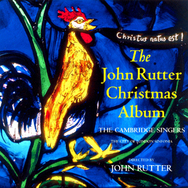
 The
John Rutter Christmas Album (Collegium CSCD510 [75:50]
– from eclassical.com
in mp3 or lossless or stream from Naxos Music Library) offers
a fairly traditional selection. Rutter haters should stay well
clear – all the tracks contain his own compositions or
arrangements: in fact Collegium describe it as the definitive
collection of these. No booklet is provided but you’ll
find it as a pdf download from the Collegium website –
here.
The
John Rutter Christmas Album (Collegium CSCD510 [75:50]
– from eclassical.com
in mp3 or lossless or stream from Naxos Music Library) offers
a fairly traditional selection. Rutter haters should stay well
clear – all the tracks contain his own compositions or
arrangements: in fact Collegium describe it as the definitive
collection of these. No booklet is provided but you’ll
find it as a pdf download from the Collegium website –
here.
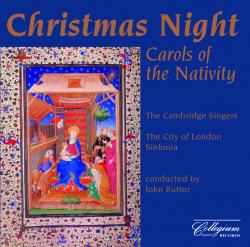
 Christmas
Night – Carols of the Nativity (Collegium
COLCD106 [62:06]) includes four of Rutter’s own arrangements
but most of the carols are sung ‘straight’. 21 tracks,
from in dulci jubilo to Rutter’s own Nativity
Carol, download from eclassical.com
(mp3 and lossless) or stream from Naxos Music Library. Neither
of these provides the booklet but, again, the Collegium website
does – here.
Christmas
Night – Carols of the Nativity (Collegium
COLCD106 [62:06]) includes four of Rutter’s own arrangements
but most of the carols are sung ‘straight’. 21 tracks,
from in dulci jubilo to Rutter’s own Nativity
Carol, download from eclassical.com
(mp3 and lossless) or stream from Naxos Music Library. Neither
of these provides the booklet but, again, the Collegium website
does – here.
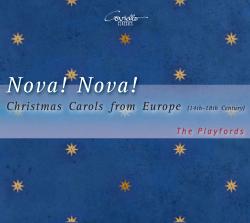
 Nova!
Nova! Christmas Carols from Europe (14th to 18th Centuries)
offers a mixture of a few familiar items with much less well-known
fare. The performers are The Playfords who, as their name suggests,
adopt a lively approach to the music: several of the items from
the Playford’s original Dancing Master collection
are included on track 14, yet there is also a reflective calmness
about much of the music. The (very) slow opening of the 15th-century
carol on track 4 is very much the exception, but I found the
arrangement strangely effective. The vocal soloist copes well
with a variety of languages.
Nova!
Nova! Christmas Carols from Europe (14th to 18th Centuries)
offers a mixture of a few familiar items with much less well-known
fare. The performers are The Playfords who, as their name suggests,
adopt a lively approach to the music: several of the items from
the Playford’s original Dancing Master collection
are included on track 14, yet there is also a reflective calmness
about much of the music. The (very) slow opening of the 15th-century
carol on track 4 is very much the exception, but I found the
arrangement strangely effective. The vocal soloist copes well
with a variety of languages.
Overall, this is an enterprising release and a delight; I do
wish, however, that we could have a moratorium on Riu, riu,
chiu (track 3), almost mandatory for any Christmas recording
now. (Coviello COV21012 [60:51] – from eclassical.com
(mp3 and lossless) or stream from Naxos Music Library.)
Unfortunately, there are no texts from either source.
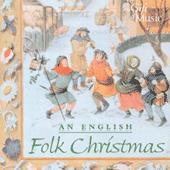
 You
won’t find Riu, riu, chiu on Christmas Folk Music:
An English Christmas Cheer in Songs and Carols (Ian Giles,
baritone and drum; Lewin Giles, vocal and instrumental and the
Spiers and Boden Duo, The Gift of Music CCLCDG1157 –
from classicsonline.com
for £4.99) but you will find some festive standards performed
with a lively swing. I must point out that my better half walked
in while I was listening and thought it horrible. Check out
other Christmas offerings on this label, too, all available
for £4.99. The inclusion of Stille Nacht rather
stretches the concept of traditional English music but,
heck, Christmas is coming.
You
won’t find Riu, riu, chiu on Christmas Folk Music:
An English Christmas Cheer in Songs and Carols (Ian Giles,
baritone and drum; Lewin Giles, vocal and instrumental and the
Spiers and Boden Duo, The Gift of Music CCLCDG1157 –
from classicsonline.com
for £4.99) but you will find some festive standards performed
with a lively swing. I must point out that my better half walked
in while I was listening and thought it horrible. Check out
other Christmas offerings on this label, too, all available
for £4.99. The inclusion of Stille Nacht rather
stretches the concept of traditional English music but,
heck, Christmas is coming.
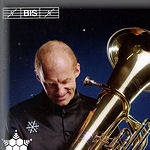
 At
least one of the items on Snowflakes – a classical Christmas
(BIS-CD-1885 [64:53] – from eclassical.com,
16 & 24-bit lossless and mp3, or stream from Naxos Music
Library) seems to fall very dubiously under the ‘classical’
umbrella: a gloopy version of ‘When you wish upon a star’
from Pinocchio? Otherwise, as Rob Barnett writes –
see his review
for full listing – ‘Everything here has a toffee apple
sweetness. The chewy melted sugar crackles and crazes to match
the fireside cheer and smiling family values.’ I have to
admit that, despite the inclusion of some unusual items, listening
once via the Naxos Library didn’t tempt me to download
this one.
At
least one of the items on Snowflakes – a classical Christmas
(BIS-CD-1885 [64:53] – from eclassical.com,
16 & 24-bit lossless and mp3, or stream from Naxos Music
Library) seems to fall very dubiously under the ‘classical’
umbrella: a gloopy version of ‘When you wish upon a star’
from Pinocchio? Otherwise, as Rob Barnett writes –
see his review
for full listing – ‘Everything here has a toffee apple
sweetness. The chewy melted sugar crackles and crazes to match
the fireside cheer and smiling family values.’ I have to
admit that, despite the inclusion of some unusual items, listening
once via the Naxos Library didn’t tempt me to download
this one.
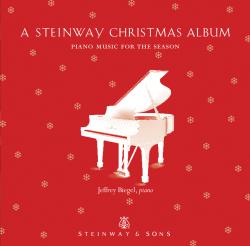
 A
Steinway Christmas tells you exactly what you get on Steinway
30005 – 21 Christmas standards played on a Steinway
piano. Though it’s a model of its kind, it comes with all
the limitations that the solo piano implies: it’s impossible
for the instrument to reproduce the ‘neigh’ at the
end of Leroy Anderson’s Sleigh Ride (track
1) for example. I was surprised even to discover that the Steinway
label existed. I can’t raise a great deal of enthusiasm
for this though some of the arrangements are very interesting,
such as that of Ding dong merrily which interweaves Bach’s
Jesu joy of man’s desiring (track 3) and it might
well serve as a template for those who are expected to exercise
their pianistic skills at Christmas. The album runs for 62:29
and comes in mp3 or lossless flac from eclassical.com.
A
Steinway Christmas tells you exactly what you get on Steinway
30005 – 21 Christmas standards played on a Steinway
piano. Though it’s a model of its kind, it comes with all
the limitations that the solo piano implies: it’s impossible
for the instrument to reproduce the ‘neigh’ at the
end of Leroy Anderson’s Sleigh Ride (track
1) for example. I was surprised even to discover that the Steinway
label existed. I can’t raise a great deal of enthusiasm
for this though some of the arrangements are very interesting,
such as that of Ding dong merrily which interweaves Bach’s
Jesu joy of man’s desiring (track 3) and it might
well serve as a template for those who are expected to exercise
their pianistic skills at Christmas. The album runs for 62:29
and comes in mp3 or lossless flac from eclassical.com.
Johann KUHNAU (1660-1722)
Ihr Himmel jubilirt von oben [13:21]
Weicht ihr Sorgen aus dem Hertzen [14:00]
Wie schön leuchtet der Morgenstern [13:46]
Gott, sei mir gnädig nach deiner Güte [12:21]
Tristis est anima mea [5:01]
O heilige Zeit [16:11]
Deborah York, Marianne Hellgren, Lisa Beckley, Susan Hamilton
(soprano)
James Bowman, Robin Blaze (counter-tenor)
Charles Daniels, James Gilchrist (tenor)
Peter Harvey, Colin Campbell (bass)
The King’s Consort/Robert King – rec. 1998. DDD.
Pdf booklet with texts and translations included
HYPERION CDH55394 [74:43] – from hyperion-records.co.uk
(mp3 and lossless)
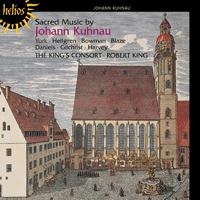
 Due
for reissue on CD at the end of January 2012, this fascinating
album is available to download now. Though most of the music
is suitable for Passiontide and Easter, Wie schön leuchtet
der Morgenstern uses a chorale which Bach and others also
employed – in Bach’s case in Cantata No.1 for the
Annunciation, but here as part of a text for the Nativity. Everything
here is a cut above the rather dull keyboard Biblical Sonatas,
the only other Kuhnau work which I had known before – I
suspect that’s at least in part due to the powerful advocacy
of the King’s Consort. With the usual excellent Hyperion
booklet of notes and texts and good recording, don’t wait
till late January to download this, the latest reissue in the
Contemporaries of Bach series.
Due
for reissue on CD at the end of January 2012, this fascinating
album is available to download now. Though most of the music
is suitable for Passiontide and Easter, Wie schön leuchtet
der Morgenstern uses a chorale which Bach and others also
employed – in Bach’s case in Cantata No.1 for the
Annunciation, but here as part of a text for the Nativity. Everything
here is a cut above the rather dull keyboard Biblical Sonatas,
the only other Kuhnau work which I had known before – I
suspect that’s at least in part due to the powerful advocacy
of the King’s Consort. With the usual excellent Hyperion
booklet of notes and texts and good recording, don’t wait
till late January to download this, the latest reissue in the
Contemporaries of Bach series.
Christmas at the Court of Dresden
Josef SEGER (1716-1782)
Prelude for organ in c minor [1:51]
Anon/Johann Georg SCHÜRER
(c1720 – 1786)
Invitatorium: Christus natus est and Psalm 94 (95) (Venite)
[11:58]
Hymnus: Jesu redemptor omnium [00:57]
Johann David HEINICHEN (1683-1729)
Pastorale per la Notte di Natale in A (S242) [3:49]
Te Deum [14:27]
Giovanni Alberti RISTORI (1692-1753)
Messa per il Santissimo Natale and Motetto pastorale
(O admirabile commercium) [44:35]
Christine Wolff (soprano); Britta Schwarz (contralto); Martin
Petzold (tenor)
Körnischer Sing-Verein Dresden, Dresdner Instrumental-Concert/Peter
Kopp – rec.2004. DDD
CARUS 83.169 [77:36] – from classicsonline.com
(mp3) or stream from Naxos Music Library
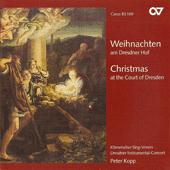 [‘Recordings
like this are very useful to put the music in its proper context…
I am happy to say that the performance never disappoints.’
– see review
by Johan van Veen]
[‘Recordings
like this are very useful to put the music in its proper context…
I am happy to say that the performance never disappoints.’
– see review
by Johan van Veen]
 Heinichen
and Gebel (below) were two contemporaries of Bach whose music
has been almost totally eclipsed by his until recently. It’s
thanks to Carus and CPO that we are gradually rediscovering
them. Both this and the Gebel recording bring us music composed
for and performed at the Court of Dresden in the mid-18th century.
Performances and recordings are excellent, even in mp3, though
there is no booklet of texts.
Heinichen
and Gebel (below) were two contemporaries of Bach whose music
has been almost totally eclipsed by his until recently. It’s
thanks to Carus and CPO that we are gradually rediscovering
them. Both this and the Gebel recording bring us music composed
for and performed at the Court of Dresden in the mid-18th century.
Performances and recordings are excellent, even in mp3, though
there is no booklet of texts.
Johann Sebastian BACH (1685-1750)
 Into
every Christmas at least a little Bach should percolate. In
the previous Roundup - here
- I included four releases from the BIS Suzuki series of the
cantatas, each containing at least one work for the Christmas
and New Year season. While approving of that recommendation,
my colleague John Quinn has chided me in the nicest possible
way for not also reminding you of the virtues of John Eliot
Gardiner’s series, recorded on his world pilgrimage in
2000 and now complete on his own SDG label.
Into
every Christmas at least a little Bach should percolate. In
the previous Roundup - here
- I included four releases from the BIS Suzuki series of the
cantatas, each containing at least one work for the Christmas
and New Year season. While approving of that recommendation,
my colleague John Quinn has chided me in the nicest possible
way for not also reminding you of the virtues of John Eliot
Gardiner’s series, recorded on his world pilgrimage in
2000 and now complete on his own SDG label.
In previous years I have highlighted some of these SDG recordings,
together with some of the series which DG Archiv released in
mixed programmes – cantatas from the 2000 series with some
earlier Gardiner recordings – before giving up the project,
but, since I find it impossible to recommend either Suzuki or
Gardiner at the expense of the other, I gladly take the opportunity
to promote SDG Volumes 14 to 18 which contain cantatas for the
season:
– Volume 14: Cantatas 40, 91, 110 and 121 – SDG113
– from classicsonline.com
(mp3). See review.
– Volume 15: Cantatas 57, 64, 133 and 151 – SDG127
– from classicsonline.com
(mp3). Recording of the Month – see review.
– Volume 16: Cantatas 28, 122, 152, 190 and 225 –
SDG137 – from classicsonline.com
(mp3). See review
and December 2010 Roundup.
– Volume 17: Cantatas 16, 41, 58, 143, 153 and 171 –
SDG150 – from classicsonline.com
(mp3). See review.
– Volume 18: Cantatas 32, 63, 65, 123, 124, 154 and 191
– SDG174 – from classicsonline.com
(mp3). Recording of the Month – see review.
– Cantatas 140 (last Sunday in Advent) and 147 – DGG
Archiv 463 5872 (rec.1990). See Christmas 2010 Roundup.
– Cantatas 63, 64, 121 and 134 – DG Archiv 463
5892 (rec.1998). See Christmas 2009 Roundup.
SDG150 and 174 are 2-CD sets, the rest are single CDs. All can
also be streamed from the Naxos Music Library and all come complete
with the conductor’s notes but no texts – these can
be easily found on the web. JQ’s reviews – follow
the links above – say it all except that the mp3 transfers
are good.
At this point I’m going to be perverse and focus on yet
a pair of non-Christmas recordings from the series:
Volume 21: Cantatas for Quinquagesima Sunday
Jesus nahm zu sich die Zwölfe, BWV22
Du wahrer Gott und Davids Sohn, BWV23
Herr Jesu Christ, wahr’ Mensch und Gott, BWV127
Sehet! Wir gehn hinauf gen Jerusalem, BWV159
Ruth Holten (soprano); Claudia Schubert (alto); James Oxley
(tenor); Peter Harvey (bass); The choirs of Clare College and
Trinity College, Cambridge; The Monteverdi Choir; English Baroque
Soloists/Sir John Eliot Gardiner.
rec. King’s College Chapel, Cambridge, 5 March 2000. DDD.
Cantatas for the Annunciation/Palm Sunday/Oculi
Himmelskönig, sei willkommen, BWV182
Widerstehe doch die Sünde, BWV54
Wie schön leuchtet der Morgenstern, BWV1
Malin Hartelius (soprano); Nathalie Stutzmann (alto); James
Gilchrist (tenor); Peter Harvey (bass); The Monteverdi Choir;
English Baroque Soloists/Sir John Eliot Gardiner.
rec. Walpole St. Peter, Norfolk, 26 March 2000. DDD.
Pdf booklet included but no texts.
SOLI DEO GLORIA SDG118 [74:50 + 60:14] – from classicsonline.com
(mp3) or stream from Naxos Music Library
[‘Any Bach lover who has yet to experience the Cantata
Pilgrimage should hasten to rectify the omission and either
of these volumes [19 and 21] would make an excellent starting
point. This is turning out to be an important and distinguished
series and I recommend these latest issues very strongly.’
See review
by John Quinn.]
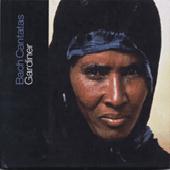 I
have two excuses for choosing this recording: first, that Cantata
No.1, for the Annunciation, features a text equally appropriate
for Christmas – see the Kuhnau recording above – and
secondly that there are some essential works here, especially
Cantatas 54 and 159. I was going to write that being back in
King’s College chapel, where his Monteverdi Choir was born,
brought out the best in John Eliot Gardiner, but how can there
be a best in a series which is beyond comparison? The presence
of the members of two other distinguished Cambridge college
choirs must have added spice to the occasion, however, as well
as reminding us that both our ancient universities contain choirs
to rival King’s. No texts, but the usual enlightening notes
from JEG’s journal make ample amends when there are plenty
of texts and translations of the cantatas online.
I
have two excuses for choosing this recording: first, that Cantata
No.1, for the Annunciation, features a text equally appropriate
for Christmas – see the Kuhnau recording above – and
secondly that there are some essential works here, especially
Cantatas 54 and 159. I was going to write that being back in
King’s College chapel, where his Monteverdi Choir was born,
brought out the best in John Eliot Gardiner, but how can there
be a best in a series which is beyond comparison? The presence
of the members of two other distinguished Cambridge college
choirs must have added spice to the occasion, however, as well
as reminding us that both our ancient universities contain choirs
to rival King’s. No texts, but the usual enlightening notes
from JEG’s journal make ample amends when there are plenty
of texts and translations of the cantatas online.
Georg GEBEL the Younger (1709-1753)
Christmas Cantatas Volume I
Verfolge mich, O Welt (St Stephen’s Day, December
26, 1747/8) [30:04]
Gott Lob! Mein Jesus macht mich rein (Sunday after Christmas,
1747/8) [40:57]
Veronika Winter (soprano); Britta Schwarz (alto); Andreas Post
(tenor); Matthias Vieweg (bass)
Les Amis de Philippe/Ludger Rémy – rec. October
2009. DDD.
CPO 777 610-2 [71:25] – from classicsonline.com
(mp3) or stream from Naxos Music Library
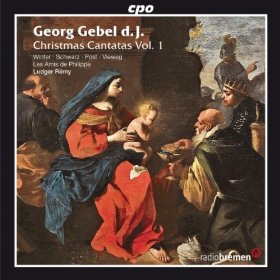
 Another
neglected contemporary of JS Bach is brought to life in this
recording of two lengthy Christmas-tide cantatas for the Dresden
Court by Georg Gebel Junior. Of course he’s no JSB, but
this recording serves to demonstrate what a wealth of beautiful
music we miss if we concentrate solely on Bach and Handel. Graupner,
for example, who was preferred by the Leipzig Council even to
JSB, Heinichen (see above) and Homilius both of whose causes
Carus have taken up effectively recently.
Another
neglected contemporary of JS Bach is brought to life in this
recording of two lengthy Christmas-tide cantatas for the Dresden
Court by Georg Gebel Junior. Of course he’s no JSB, but
this recording serves to demonstrate what a wealth of beautiful
music we miss if we concentrate solely on Bach and Handel. Graupner,
for example, who was preferred by the Leipzig Council even to
JSB, Heinichen (see above) and Homilius both of whose causes
Carus have taken up effectively recently.
There’s more Christmas-tide music from Gebel on CPO
999 993-2 [69:17] – from classicsonline.com
(mp3): an Oratorio for Christmas Eve [36:22] and one for
the New Year [32:55] which Johan van Veen recommended with slight
reservations – see review.
I take heart, too, from the ‘Volume I’ affixed to
the title of the new recording, though Volume II is not yet
available for download. Don’t even dream of downloading
Volume I from emusic.com for a ridiculous £11.34 when
it comes for £7.99 from classicsonline.com.
CHRISTMAS MUSIC
Carl BÖDDECKER (1607-1683)
Natus est Jesus [4:55]
Alessandro SCARLATTI (1660-1725)
Non sò qual più m’ingombra [14:35]
Johann PACHELBEL (1653-1706)
Canon and Gigue [5:10]
Johann Sebastian BACH (1685-1750)
Nun komm, der Heiden Heiland, BWV61 – Öffne
dich mein ganzes Herz [3:20]
Orchestral Suite No. 3 in D, BWV1068 – Air [4:10]
Herz und Mund und Tat und Leben, BWV147a – Bereite
dir, Jesu, noch itzo die Bahn [4:11]
Alessandro SCARLATTI O
di Betlemme, altera povera venturosa [16:38]
Arcangelo CORELLI (1653-1713)
Concerto grosso in g minor, Op. 6/8, ‘Fatto per la notte
di natale’ [13:05]
Emma Kirkby (soprano); London Baroque/Charles Medlam (cello)
Pdf booklet with texts and translations included
BIS CD-1135 [66:49] – from eclassical.com
(mp3 and lossless)
[‘No admirer of either baroque music or Emma Kirkby will
want to miss this impeccably programmed disc … Many, many
delights await you.’ – see 5/5-star review
by Colin Clarke.]
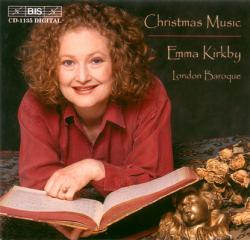
 My
only reservation in making this my first choice of this
month’s Christmas recordings is that we could well have
forgone the orchestral items, of which there are plenty of recommendable
versions to suit all tastes, in favour of more from Ms Kirkby.
The Corelli is all well and good – the slow movement evoking
the Christmas shepherds – but why include Pachelbel’s
ubiquitous greatest hit? Setting all that aside, the superb
fresh-voiced singing, excellent accompaniment and recording
and the inclusion of the booklet with the texts amply atones.
If you’re sated with the usual stuff, Hark, the herald
angels sing/Emma Kirkby’s just the thing. (With apologies
to the young Thomas Beecham who, as Neville Cardus reports in
A Mingled Chime, adapted the carol in similar fashion
to advertise his family’s famous pills.)
My
only reservation in making this my first choice of this
month’s Christmas recordings is that we could well have
forgone the orchestral items, of which there are plenty of recommendable
versions to suit all tastes, in favour of more from Ms Kirkby.
The Corelli is all well and good – the slow movement evoking
the Christmas shepherds – but why include Pachelbel’s
ubiquitous greatest hit? Setting all that aside, the superb
fresh-voiced singing, excellent accompaniment and recording
and the inclusion of the booklet with the texts amply atones.
If you’re sated with the usual stuff, Hark, the herald
angels sing/Emma Kirkby’s just the thing. (With apologies
to the young Thomas Beecham who, as Neville Cardus reports in
A Mingled Chime, adapted the carol in similar fashion
to advertise his family’s famous pills.)
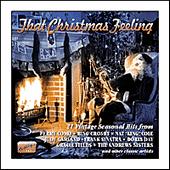
 Finally,
from my best Christmas recommendation to my turkey: this
one’s so bad in places that it’s actually fascinating.
That Christmas Feeling (Naxos Nostalgia 8.120564
[63:14] – from classicsonline.com
in mp3 or stream from Naxos Music Library) contains 21 seasonal
hits from 1932 to 1950, performed by the likes of Bing Crosby
at his dreamy best or worst according to taste, sometimes in
partnership with one or more of the Andrews Sisters, Gene Autry
(the Singing Cowboy), Judy Garland, Arty Shaw and Gracie Fields
in such well-known favourites as Rudolf the red-nosed Reindeer.
It’s all good fun apart from I Yust go Nuts at Christmas
and, worst of all All I want for Christmas is my two Front
Teeth, sung by an annoying infant. Whatever you think of
the other tracks, you’ll hate those two so much that you’ll
love them. The recordings are variable, with little attempt
to clean up the crackle. £4.99 in the UK but not available
in the US – perhaps our American readers should be grateful.
Finally,
from my best Christmas recommendation to my turkey: this
one’s so bad in places that it’s actually fascinating.
That Christmas Feeling (Naxos Nostalgia 8.120564
[63:14] – from classicsonline.com
in mp3 or stream from Naxos Music Library) contains 21 seasonal
hits from 1932 to 1950, performed by the likes of Bing Crosby
at his dreamy best or worst according to taste, sometimes in
partnership with one or more of the Andrews Sisters, Gene Autry
(the Singing Cowboy), Judy Garland, Arty Shaw and Gracie Fields
in such well-known favourites as Rudolf the red-nosed Reindeer.
It’s all good fun apart from I Yust go Nuts at Christmas
and, worst of all All I want for Christmas is my two Front
Teeth, sung by an annoying infant. Whatever you think of
the other tracks, you’ll hate those two so much that you’ll
love them. The recordings are variable, with little attempt
to clean up the crackle. £4.99 in the UK but not available
in the US – perhaps our American readers should be grateful.
***
Joseph HAYDN
(1732-1809)
String Quartet No.61 in d minor, Op.76/2, Hob.III/76 (Fifths)
String Quartet No.62 in C, Op.76/3, Hob.III/77 (Emperor)
String Quartet No.63 in B flat, Op.76/4, Hob.III/78 (Sunrise)
Gewandhaus Quartett – rec.2004. DDD.
NEW CLASSICAL ADVENTURE NCA60148-210 [70:26] – from
classicsonline.com
(mp3) or NCA62937-210 – also from classicsonline.com
or stream with either catalogue number from Naxos Music Library
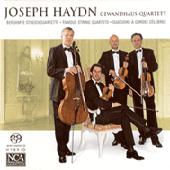 The
existence of two versions of this recording, with different
catalogue numbers, seems to arise from the fact that New Classical
Adventure – a label new to me, though the Naxos Music Library
and classicsonline.com list several of their recordings –
have released the parent disc in both SACD and CD formats. On
the showing of this recording, it would seem that their catalogue
is worth investigating.
The
existence of two versions of this recording, with different
catalogue numbers, seems to arise from the fact that New Classical
Adventure – a label new to me, though the Naxos Music Library
and classicsonline.com list several of their recordings –
have released the parent disc in both SACD and CD formats. On
the showing of this recording, it would seem that their catalogue
is worth investigating.
There’s a rival Naxos coupling of these three works from
the Kodály Quartet – an alternative, made at different
sessions, to their complete Op.76 performances which are spread
over two CDs. That’s been my version of choice since I
bought it in the early days of Naxos when their CDs cost £3.99
from Woolworths, of blessed memory and I’d still recommend
the classicsonline.com download of that at £4.99. I do
think, however, that the Gewandhaus performances have a slight
edge on it, and they too come at £4.99 in good mp3 sound.
These three named quartets go well together, but those requiring
the complete Op.76 will need to have the Kodály Quartet
set or, a little more expensively, the Quatuor Mosaïques
in period instrument performances on Naïve, also from classicsonline.com
– here.
Jakub Jan RYBA (1765-1815)
Czech Christmas Mass – Hej, mistre [38:39]
My lovely Nightingale * [4:14]
Jaroslava Vymazalova (soprano); Marie Mrazova (contralto); Benno
Blachut (tenor); Zdenek Kroupa (bass)
Helena Tattermuschova (soprano) *; Jaroslav Josifko (flute)
*
Milan Slechta (organ)
Jaroslav Vodrazka (organ) *
Czech Philharmonic Chorus
Prague Symphony Orchestra/Vaclav Smetacek – rec. 1965.
ADD
SUPRAPHON SU36582 [42:59] – from
emusic.com (mp3)
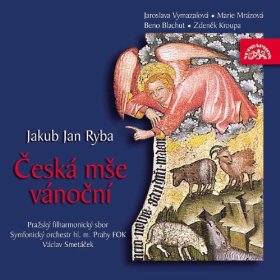
 This
is the same recording that Jonathan Woolf reviewed
in 2003, though it’s had a change of cover. The short value
is covered by emusic.com’s policy of charging by the track
– £4.20 or less for the album in this case. Ryba’s
Christmas Mass, like the similar work by Pascha, is fun music,
with vernacular texts replacing the sections of the Latin Mass.
Performance-wise honours are about even between this and the
Naxos recording which I reviewed in the Christmas 2009 Roundup.
Though the latter is a digital recording, the older Supraphon
still sounds well, even though emusic.com offer it at a bit-rate
of only around 200 kb/s. With extra music for less than £1
more from classicsonline.com, you may well think the Naxos the
better bargain – try it out at the Naxos Music Library.
The new recording on Arco Diva UP0142-2 reviewed by Gary
Higginson – here
– has not yet appeared as a download, but the CD can be
purchased for £12, including p&p, direct from Musicweb
International – here.
This
is the same recording that Jonathan Woolf reviewed
in 2003, though it’s had a change of cover. The short value
is covered by emusic.com’s policy of charging by the track
– £4.20 or less for the album in this case. Ryba’s
Christmas Mass, like the similar work by Pascha, is fun music,
with vernacular texts replacing the sections of the Latin Mass.
Performance-wise honours are about even between this and the
Naxos recording which I reviewed in the Christmas 2009 Roundup.
Though the latter is a digital recording, the older Supraphon
still sounds well, even though emusic.com offer it at a bit-rate
of only around 200 kb/s. With extra music for less than £1
more from classicsonline.com, you may well think the Naxos the
better bargain – try it out at the Naxos Music Library.
The new recording on Arco Diva UP0142-2 reviewed by Gary
Higginson – here
– has not yet appeared as a download, but the CD can be
purchased for £12, including p&p, direct from Musicweb
International – here.
Edmund Pascha’s even more colourful work in the same vein
seems not to be available complete, but the 12-minute Gloria
from it is available on The Christmas Album (Taverner
Consort and Players/Andrew Parrott). Czech and Slovak versions
sound more appropriately rough and ready; though this will do
nicely faute de mieux,. if you see a copy of Miroslav
Venhoda’s recording of this work with the Prague Madrigal
Singers on Campion RRCD1305 snap it up. There’s an attractive
version of M A Charpentier’s In nativitatem canticum,
H414 on the same album: Virgin Classics 0724354515552
[62:58] – from classicsonline.com
(mp3) or stream from Naxos Music Library.
Pyotr Ilyich TCHAIKOVSKY (1840-1893)
The Nutcracker (complete ballet), Op.71 (1892) [93:07]
Russian National Orchestra/Mikhail Pletnev
ONDINE ODE1180-2D [49:01 + 44:16] – from classicsonline.com
(mp3) or eclassical.com
(mp3 and lossless)
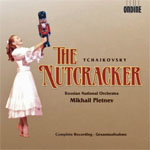 Another
Christmas, another Nutcracker, so how does this compare
with last year’s offering from Simon Rattle or the budget-price
version by André Previn? For starters, both Rattle and
Pletnev take two whole CDs with no coupling and so represent
poor value for money by comparison with Previn, unless you settle
for the slightly abridged single-CD version of the Rattle. Previn
comes in two guises on EMI, coupled with La Sylphide,
available on 5099996769454 from classicsonline.com for £7.99
– here
– or with highlights from Prokofiev’s Cinderella
on 0094639323357 from classicsonline.com for £6.99 –
here.
When I recommended the latter recently (September 2011/2 Roundup),
the La Sylphide coupling was too expensive but classicsonline.com
have been putting their EMI budget twofers out at more reasonable
prices recently, so either is now very good value.
Another
Christmas, another Nutcracker, so how does this compare
with last year’s offering from Simon Rattle or the budget-price
version by André Previn? For starters, both Rattle and
Pletnev take two whole CDs with no coupling and so represent
poor value for money by comparison with Previn, unless you settle
for the slightly abridged single-CD version of the Rattle. Previn
comes in two guises on EMI, coupled with La Sylphide,
available on 5099996769454 from classicsonline.com for £7.99
– here
– or with highlights from Prokofiev’s Cinderella
on 0094639323357 from classicsonline.com for £6.99 –
here.
When I recommended the latter recently (September 2011/2 Roundup),
the La Sylphide coupling was too expensive but classicsonline.com
have been putting their EMI budget twofers out at more reasonable
prices recently, so either is now very good value.
My first impression of the new recording, that Pletnev adopts
noticeably slow tempi, is borne out by comparing timings of
most individual sections with Rattle and Previn. Sometimes the
difference is quite noticeable, as in the Scene and Grandfather’s
Dance (track 6) which almost comes to a halt at times. We
septuagenarians may be a bit slow on our pins – Previn’s
and Rattle’s grandfathers are certainly no sprinters –
but this is a very slow grandfather indeed. Tempo di Grossvater
in the score may be ambiguous but most conductors apart from
Pletnev adopt a (significantly) faster tempo. Under Pletnev
the whole of Act I No.5 takes 7:56 against 6:14 from Rattle,
who also enlivens the section with some extra whizz-bangs, 6:00
from Bonynge (see below), 5:42 from Previn and 5:35 from Ansermet
(see below). Even the next slowest version that I can find of
this section, an anonymous version on YouTube – here
– takes 6:35.
Pletnev’s Tchaikovsky regularly divides opinion: neither
Brian Reinhart – see review
– nor I had much time for his recent recording of the Fifth
Symphony on PentaTone, yet others have raved about it, so I’m
prepared to accept that many will enjoy his Nutcracker.
For all that I enjoyed perhaps half of this performance –
the exciting Battle, which follows the caricature Grandfather
Dance, for example, the ensuing Transformation Scene
and most of the Act II Dances – and though the recording
is good, you’ll need to include me out, to quote Sam Goldwyn.
Stay with Rattle or Previn according to taste and size of purse
or wallet. Incidentally, Dutch speakers will find a narrated
version of Rattle’s recording, de Notenkraker at
the Naxos Music Library, where you can also compare all three
of the Nutcrackers that I’ve been considering.
Should neither Previn nor Rattle appeal, passionato.com have
the set from Richard Bonynge (Decca 444 8272 – see November
2010 Roundup).
Still well worth considering – it remains my favourite
in many ways – the Ansermet recording has been reissued
on Decca Eloquence 480 0557 for around £12 – not
available to download.
Nikolay Andreyevich RIMSKY-KORSAKOV
(1844-1908)
Suite from The Snow Maiden (1880-81) [12:34]
Sadko – Musical picture, Op.5 (1869, rev. 1892 )
[10:53]
Suite from Mlada (1889-90) [18:24]
Suite from Le Coq d’Or (1907) [28:13]
Seattle Symphony/Gerard Schwarz – rec. 2011. DDD.
Pdf booklet included.
NAXOS 8.572787 [70:04] – from classicsonline.com
(mp3) or stream from Naxos Music Library
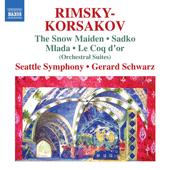 Seattle,
Schwarz and Naxos are becoming an unassailable combination.
First a version of Sheherazade to be reckoned with (Bargain
of the Month – see review,
March 2011/1 Roundup
and review),
followed by Capriccio espagnol, May Night, etc.
(Bargain of the Month – see review,
September 2011/2 Roundup
and review)
and the two-and-a-half Borodin symphonies (Bargain of
the Month – see review
and August 2011/2 Roundup),
now Schwarz, the Seattle Symphony and Naxos combine again to
give us a version of four Rimsky suites which once more challenges
existing recommendations.
Seattle,
Schwarz and Naxos are becoming an unassailable combination.
First a version of Sheherazade to be reckoned with (Bargain
of the Month – see review,
March 2011/1 Roundup
and review),
followed by Capriccio espagnol, May Night, etc.
(Bargain of the Month – see review,
September 2011/2 Roundup
and review)
and the two-and-a-half Borodin symphonies (Bargain of
the Month – see review
and August 2011/2 Roundup),
now Schwarz, the Seattle Symphony and Naxos combine again to
give us a version of four Rimsky suites which once more challenges
existing recommendations.
Maybe I was not quite enthusiastic enough about the Sheherazade
– (very) much as I like it, I still think Beecham and Reiner
unassailable – but I’d back the new recording even
against strong competition. For quality and price in these suites,
that competition largely boils down to the budget 2-CD set from
Järvi on Chandos, also containing the magical Christmas
Eve, which I recommended in the December 2008 Roundup.
As a 2-for-1 offer that Chandos set works out at the same price
as two Naxos CDs in mp3 format from theclassicalshop.net,
with the lossless version a little more expensive.
The Naxos recording will doubtless appear in lossless sound
from eclassical.com in due course, as the recording of Capriccio
espagnol already has but their price-per-second policy,
which normally makes their downloads the most economical on
the market, breaks down for bargain labels: $12:07 is way too
expensive for a budget-price recording which costs less than
£6 on CD in the UK, though it may be attractive to readers
in the USA where I’m aware that Naxos CDs cost a good deal
more.
Claude DEBUSSY (1862-1918) Orchestral
Works Volume 7
Fantaisie for Piano and Orchestra (revised version, pub.1968)
[24:21]
Première Rapsodie for Orchestra with Principal
Clarinet [7:36]
Rapsodie for Saxophone and Orchestra (orch. J. ROGER-DUCASSE)
[10:00]
Deux Danses for Harp and Strings (Danse sacrée
et danse profane) [9:13]
Jean-Yves Thibaudet (piano); Paul Meyer (clarinet); Alexandre
Doisy (saxophone); Emmanuel Ceysson (harp)
Orchestre National de Lyon/Jun Märkl – rec. September
and October 2010 and March 2011. DDD
Pdf booklet included.
NAXOS 8.572675 [51:27] – from classicsonline.com
(mp3) or stream from Naxos Music Library
[See A Man of the World – Jeremy Siepmann talks
to Jun Märkl – here.]
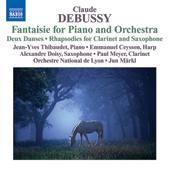 This,
the seventh volume in Naxos’s complete recordings of Debussy’s
Orchestral Music, uniquely gathers together his concertante
works on a single CD.* I was surprised to discover not only
that no other single recording has this obvious combination
but that there are so few versions of the Fantaisie in
the current catalogue. Two of these couple the work with the
Ravel Piano Concertos – Anne Queffélec on budget-price
Warner Apex and Jean-Efflam Bavouzet on Chandos – and both
offer strong competition to the new recording: the Chandos was
my joint Download of the Month in the January
2011 Roundup.
I still marginally prefer Bavouzet’s and Tortelier’s
slightly more urgent performance, especially as that can be
obtained in 16- and 24-bit lossless sound, but there’s
not a great deal in it. In sum, the Fantaisie is an unjustly
neglected work and the choice of version can safely be left
to your preferred coupling – if you want the Ravel concertos,
they are played on Chandos as well as any other version that
I’ve heard.
This,
the seventh volume in Naxos’s complete recordings of Debussy’s
Orchestral Music, uniquely gathers together his concertante
works on a single CD.* I was surprised to discover not only
that no other single recording has this obvious combination
but that there are so few versions of the Fantaisie in
the current catalogue. Two of these couple the work with the
Ravel Piano Concertos – Anne Queffélec on budget-price
Warner Apex and Jean-Efflam Bavouzet on Chandos – and both
offer strong competition to the new recording: the Chandos was
my joint Download of the Month in the January
2011 Roundup.
I still marginally prefer Bavouzet’s and Tortelier’s
slightly more urgent performance, especially as that can be
obtained in 16- and 24-bit lossless sound, but there’s
not a great deal in it. In sum, the Fantaisie is an unjustly
neglected work and the choice of version can safely be left
to your preferred coupling – if you want the Ravel concertos,
they are played on Chandos as well as any other version that
I’ve heard.
If you’re looking for the other Debussy works, they, too,
receive attractive performances and the recording is good. When
classicsonline.com say that their bit-rate is 320 kb/s you can
rely on it being so – which is not always the case even
with some suppliers who claim the lower 256kb/s.
* There’s a recommendable budget 2-CD EMI set which includes
them all plus Petite Suite, Children’s Corner
and Khamma (3652402 – download from classicsonline.com
(0094636524054) for £6.99.). Aldo Ciccolini is
the free-wheeling soloist in the Fantaisie with Jean
Martinon at the helm. It’s also available for streaming
from the Naxos Music Library.
Ralph VAUGHAN WILLIAMS (1872-1958)
Folk Songs of the Four Seasons (1951) [41:41]
Prologue: to the Ploughboy
Spring: Early in the Spring (for three voices unaccompanied);
The Lark in the Morning (for two voices);
May Song – Full chorus with semi-chorus.
Summer: Summer is a-coming in and The Cuckoo – Full
chorus;
The Sprig of Thyme – Full chorus;
The Sheep Shearing – (for two voices unaccompanied); The
Green Meadow (unison – all voices)
Autumn: John Barleycorn (full chorus with semi-chorus);
The Unquiet Grave (for three voices unaccompanied); An Acre
of Land (unison – all voices)
Winter: Children’s Christmas Song (in two-part harmony);
Wassail Song (unison with descant);
In Bethlehem City (for three voices unaccompanied);
God Bless the Master (unison with descant) (world première
recording)
In Windsor Forest (1930) (world première of this
arrangement for women’s voices by Guthrie Foot) [13:37]
Choir of Clare College, Cambridge; Dmitri Ensemble, Cambridge/Sir
David Willcocks – rec. January 2009.
ALBION ALBCD010 [55:22] – from classicsonline.com
(mp3) or stream from Naxos Music Library
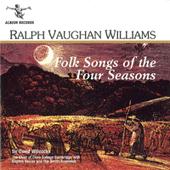 [‘Of
the five Albion discs issued to date the most ambitious and
exciting is this latest.’ – see review
by Rob Barnett.]
[‘Of
the five Albion discs issued to date the most ambitious and
exciting is this latest.’ – see review
by Rob Barnett.]
Albion’s latest release, of Vaughan Williams’ On
Christmas Day (ALBCD013) seems not yet to have reached
the download sites at the time of writing, but the Winter
section of this ground-breaking earlier album of Music for
the Four Seasons will do very well for the season. There
are no texts but the download is very inexpensive at £4.99.
Mandatory for all lovers of VW, who should have fun spotting
all the tunes that he recycled in his other music.
Sergei RACHMANINOV (1873-1943)
CD 1 [74:41]
Piano Concerto No. 1 in f sharp minor Op.1 [26:02]
Piano Concerto No. 4 in g minor Op.40 [24:35]
Rhapsody on a Theme of Paganini Op.43 [23:44]
CD 2 [70:54]
Piano Concerto No. 2 in c minor Op.18 [32:26]
Piano Concerto No. 3 in d minor Op.30 [38:23]
Stephen Hough (piano)
Dallas Symphony Orchestra/Andrew Litton – rec. live 2003
and 2004. DDD.
HYPERION CDA30014/2 [74:41 + 70:54] – CD only from
hyperion-records.co.uk
– not available as download
[‘A must have. A revelation. Get it’. Recording of
the Month. See review
by Kevin Sutton.
‘A truly superb set of Rachmaninov works for piano and
orchestra.’ See review
by Colin Clarke.]
[See also slightly less positive review
by Christopher Howell and review
of Nos. 2 and 3 by Stephen Francis Vasta.]
Sergei RACHMANINOV (1873-1943)
CD 1 [54:57]
Piano Concerto No.1, Op.1 [24:18]
Piano Concerto No.2, Op.18 [30:29]
CD 2 [79:22]
Piano Concerto No.3, Op.30 [35:24]
Piano Concerto No.4, Op.40 [23:01]
Rhapsody on a Theme of Paganini, Op.43 [20:37]
Earl Wild (piano)
Royal Philharmonic Orchestra/Jascha Horenstein – rec. 1965.
ADD.
Pdf booklet available.
CHANDOS CHAN7114 [54:57 + 79:22] – from
theclassicalshop.net (mp3 and lossless)
[‘I confidently recommend this set which contains so many
memorable and deeply moving and viscerally exciting moments.’
– see 5-star review
of earlier Chandos release by Rob Barnett.]

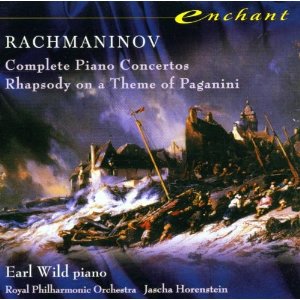 Last
time I looked at some of the available recordings of Rachmaninov
Symphonies, so it’s logical to follow up with the Piano
Concertos. The Vladimir Ashkenazy/André Previn
versions of Nos. 2 and 3 have been my benchmarks for a long
time now and they remain very competitive. They can be obtained
on a Double Decca set of all four concertos from passionato.com
in mp3 or lossless sound (444 8392 – here).
Last
time I looked at some of the available recordings of Rachmaninov
Symphonies, so it’s logical to follow up with the Piano
Concertos. The Vladimir Ashkenazy/André Previn
versions of Nos. 2 and 3 have been my benchmarks for a long
time now and they remain very competitive. They can be obtained
on a Double Decca set of all four concertos from passionato.com
in mp3 or lossless sound (444 8392 – here).
I couldn’t leave out the Hough/Litton version, which
also includes the Paganini Rhapsody, on Hyperion, even
though, for copyright reasons, it’s not available as a
download. In compensation, the CDs were reissued as part of
Hyperion’s 30th Birthday celebrations at upper mid price
(£19.98 direct from Hyperion). If you just want the best
known, Nos.2 and 3, they can be obtained on a single CD, CDA67649.
The SACDs are no longer available.
Though these Hyperion recordings have met with almost universal
adulation, if you look at the four Musicweb International reviews
listed above, you’ll see that two proclaim the set an outright
winner while the other two are more circumspect. For me these
versions are winners, especially in the case of the ‘also-rans’,
the First and Fourth Concertos, far preferable to Philippe Entremont
and Eugene Ormandy (formerly on Sony Essential Classics SBK46541,
with the Rhapsody) which has sat in my CD collection
for too long. There’s not too much wrong with those performances
but Hough and Litton’s rather sharper timings in the first
two movements of No.4 are preferable – the slow movement
is languorous enough at 6:22: Entremont and Ormandy stretch
it a little too far, to 6:57 – and the Sony recording (1958
and 1963) is dated.
Hough’s Paganini Rhapsody is a little slow to get
going, perhaps because it was recorded in the studio and lacks
the live audience. I’d have liked a little more schmalz
in variation XVIII but found the interpretation successful overall.
The tempi for No.2 are on the fast side, especially in the adagio
sostenuto slow movement where Hough’s 11:02 compares with
Ashkenazy’s 11:53 and Jenö Jandó’s 11:17
(Naxos 8.550117, with the Rhapsody, a recommendable budget-price
version). Yet there’s no lack of emotion in this performance
– I couldn’t wish the opening movement a second slower:
there’s all the yearning here despite the fact that this
performance takes over a minute less than Ashkenazy and Jandó
and the same applies to the second movement. A free-wheeling,
though sensitive finale rounds off as good a performance as
any that I’ve heard, followed, like all the concerto recordings
by well-deserved applause. For all the virtues of Jandó
and Lehel, it’s off to the charity shop with their Naxos
recording.
A fastish performance of Concerto No.3 which almost convinces
me that it’s the equal of No.2 – not that I need too
much persuading – concludes a fine pair of CDs. The recordings
throughout are excellent – it’s just a shame that
Hyperion have deleted their SACD versions. The notes, too, are
excellent, with a short foreword by Stephen Hough himself.
Christopher Howell in his review – see above – expressed
a preference for the cycle recorded in 2001 by Oleg Marshev,
the Aarhus SO and James Loughran (Danacord DACOCD582-583)
which can be downloaded, complete with booklet, from classicsonline.com
in mp3. Unfortunately, they haven’t realised that this
set is offered as three-for-two, though it’s clearly marked
as such on the cover, so their price of £23.97 compares
poorly with the discs, available in the UK for around £20.
That Marshev runs to three CDs tells its own story concerning
timings – noticeably slower than Hough, with the adagio
sostenuto of No.2 taking 12:11, slower than any of the three
versions which I’ve compared above. I listened to Marshev’s
version of this concerto through the Naxos Music Library, expecting
to find it heavy and ponderous by comparison. It’s certainly
a big-boned interpretation; right from the start the listener
is aware that this is going to be a powerful statement in a
larger-than-life recording. That slow movement really is slow
and I might well have found it painfully so if heard immediately
after Hough, but it makes sense within the context of the whole
performance. I wouldn’t rate this as my favourite version
of the concerto but I can fully understand that others might,
especially ardent fans of Brief Encounter.
So what is the ‘right’ tempo for the slow movement
of the Second Concerto? Rachmaninov himself takes just 10:40
without sounding hurried in his rather cool 1929 recording with
Stokowski – miraculously brought back to life on Naxos
Historical 8.110601, despite some heavy surface swish. The closest
you get to that on a modern recording comes from Earl Wild
and Jascha Horenstein, who even undercut the master
at 10:25. I don’t like playing the Building a Library game,
which often over-emphasises differences in tempo and interpretation,
but I did listen to Wilde in this movement immediately after
Rachmaninov and was struck by the similarity of interpretation
– the lightness of the soloists’ touch, as far as
the huge differences in recording quality allow, and the way
in which they and their respective conductors keep the music
moving forward without understating its emotional content.
This recording from the 1960s has been round the block a time
or two, with a brief appearance on the Chesky label, along with
the other concertos, which earned 4/5-star ratings from Rob
Barnett, before Chandos reissued the 2-CD set in various formats.
For RB’s enthusiastic review of the original Chandos release,
see above. The recording is superb for its age. If you can live
with a slightly abbreviated version of the Third Concerto –
Hough and Litton also restore a brief cut in the Fourth Concerto
– this recording, originally made for Reader’s
Digest, is well worth considering by all except those who
insist on their Rachmaninov being dreamy.
If you’re looking for a compromise between extremes of
tempo – not that it sounds like a compromise at all –
Hough and Litton are your men.
The Chandos recording costs £16.50 on CD, direct from
the company, and £11.99 as a lossless download. Don’t
choose the alternative download (CHAN10078), which costs £15.99.
The Hyperion 2-CD set costs a tad more at £19.98, again
direct from the company. You’ll find both for less from
some online dealers.
John FOULDS (1880-1939)
Keltic Overture op.28 (1930) [7:26]
Keltic Suite op.29 (1911) (The Clans; A Lament; The Call) [15:04]
Sicilian Aubade (1927) [5:48]
Isles of Greece op.48 no.2 (Impressions of time and place no.2)
(1927) [4:26]
Holiday Sketches op.16 (1908) (Festival in Nuremberg; Romany
from Bohemia; Evening in the Odenwald; Bells at Coblentz) [15:10]
An Arabian Night (1936-37) [6:04]
Suite Fantastique, Op.72 (from the music to a French
Pierrot play) (1924) (Pierrette and Pierrot; Chanson Plaintive;
The Wayside Cross; Carnival Procession) [14:12]
Katharine Wood (cello solo); Cynthia Fleming (violin solo);
Roderick Elms (organ)
BBC Concert Orchestra/Ronald Corp – rec. March 2010. DDD
DUTTON EPOCH CDLX7252 [68:06] – from iTunes (mp3)
[‘From the opening horn-calls of Foulds’ Keltic
Overture echoing across the sound-stage and his achingly
lovely melody at the heart of the overture (beginning at 3:03),
I was transfixed by this CD’ – see review
by Ian Lace and review
by Rob Barnett.]
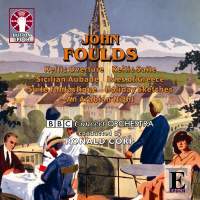 Seeing
this among Ian Lace’s choices for Recordings of the
Year – here
– and knowing that iTunes had recently added some Dutton
albums to their offerings, I decided to give it a try and was
as thoroughly convinced as my two colleagues. I’m not a
fan of iTunes for many reasons, partly because you have to alter
the ‘open with’ property of the files if you wish
to play, burn to CDR or sync to mp3 player using anything other
than the iTunes jukebox. The music is delightful, performance
and recording totally convincing and the mp3 transfer more than
acceptable, though iTunes have yet to up their game from 256kb/s
to the full 320kb/s.
Seeing
this among Ian Lace’s choices for Recordings of the
Year – here
– and knowing that iTunes had recently added some Dutton
albums to their offerings, I decided to give it a try and was
as thoroughly convinced as my two colleagues. I’m not a
fan of iTunes for many reasons, partly because you have to alter
the ‘open with’ property of the files if you wish
to play, burn to CDR or sync to mp3 player using anything other
than the iTunes jukebox. The music is delightful, performance
and recording totally convincing and the mp3 transfer more than
acceptable, though iTunes have yet to up their game from 256kb/s
to the full 320kb/s.
Listeners really need notes to appreciate lesser-known music
like this. I’ve followed up a colleague’s suggestion
to Dutton that they might consider making their booklets available
as pdf downloads from their own site, as several labels do,
but neither of us has received any response to date.
Emusic.com have an inexpensive download of three of Foulds’
works, taken from a 1982 LP on the Forlane label: Saint Joan
Suite, Op.82b, Pasquinade Symphonique, Op.98 and Mirage,
Op.20, performed by the Luxemburg Radio Symphony Orchestra under
Leopold Hager (classical.com music, £1.26 or less in mp3
from emusic.com:
£6.99 from amazon.co.uk.) Decent performances and recordings
make a good case for the music, though only Mirage approaches
the quality of the music on Dutton.
For Foulds’ Dynamic Triptych, coupled with Vaughan
Williams Piano Concerto (Lyrita SRCD.211) see review
by Colin Clarke and January 2009 Roundup.
John RUTTER (b.1945) Music
for Christmas
Shepherd’s Pipe Carol [2:52]
Nativity Carol [4:50]
There is a Flower [4:12]
Sans Day Carol [2:52]
What sweeter music? [4:15]
I wonder as I wander [3:15]
Jesus Child [3:07]
Wild Wood Carol [3:27]
The very best time of year [3:29]
Away in a manger [2:23]
Angel Tidings [1:37]
Christmas Lullaby [3:58]
Dormi Jesu [4:46]
Love came down at Christmas [2:22]
Star Carol [2:45]
Carol of the Children [3:12]
Mary’s Lullaby [3:08]
Silent night [3:31]
Angels’ Carol [3:12]
Candlelight Carol [3:53]
Second Amen [0:53]
Donkey Carol [3:25]
Polyphony
City Of London Sinfonia/Stephen Layton – rec. 2001. DDD.
Pdf booklet with texts included
HYPERION CDA67245 [71:24] – from hyperion-records.co.uk
(mp3 and lossless)
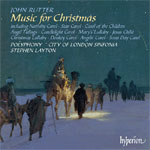

We all have our blind spots – I’m not very impressed
by the Libera Christmas Album and I’ve awarded Naxos’s
Nostalgic Christmas offering a turkey – but I have to admit
to a fondness for John Rutter, especially his Christmas music,
though I know that it has a deleterious effect on many people.
If you agree with me, this Hyperion recording makes a fine addition
to the recordings on his own Collegium label (above). If anyone
can equal Rutter’s Cambridge Singers at the Christmas game,
it’s Polyphony with Stephen Layton, and the lossless download
sounds fine.
Looking
ahead
Neujahrskonzert – New Year’s Day Concert 2011
CD 1
Johann STRAUSS II (1825-1899)
Reiter-Marsch Op.428 [3:09]
Donauweibchen, Op.427 [9:00]
Amazonen-Polka, Op.9 [2:49]
Debut-Quadrille, Op.2 [4:55]
Joseph LANNER (1801-1843) Die
Schönbrunner, Walzer Op.200 [8:57]
Johann STRAUSS II (1825-1899)
Muthig Voran! Polka schnell, Op.432 [2:52]
Ritter Pasman: Csardas [4:56]
Abschieds-Rufe – Walzer, Op.179 [9:40]
CD 2
Johann STRAUSS I (1804-1849)
Furioso-Galopp nach Liszt’s Motiven, Op.114
[2:55]
Franz LISZT (1811-1886),
arr. Ferruccio BUSONI (1866-1924)
Mephisto Waltz No.1, S.514 [10:36]
Josef STRAUSS (1827-1870) Aus
der Ferne – Polka mazur, Op.270 [5:19]
Johann STRAUSS II Spanischer
Marsch Op.433 [5:14]
Joseph HELLMESBERGER (1855-1907)
Zigeunertanz aus ‘Die Perle von Iberien’ [3:38]
Johann STRAUSS I Cachucha
Galopp Op.97 [2:09]
Josef STRAUSS Mein Lebenslauf
ist Lieb’ und Leben – waltz, Op.263 [7:56]
Eduard STRAUSS (1835-1916)
Ohne Aufenthalt, Polka Schnell, Op.112 [2:30]
New Year’s Address 2011 [0:34]
Johann STRAUSS II An
der schönen blauen Donau, Op.314 [10:26]
Johann STRAUSS I Radetzky
March Op.228 [3:38]
Vienna Philharmonic Orchestra/Franz Welser-Möst –
rec. January 2011. DDD.
DECCA 478 2601 [46:18 + 54:55] – from amazon.co.uk
(mp3) or deutschegrammophon.com
(lossless)
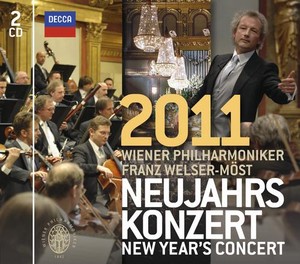 If
you’re already looking ahead to the New Year and/or you’re
a fan of the Strauss family and didn’t get the 2011 concert
when it was released, it’s yours for £8.49 from amazon.co.uk
in mp3 or for £11.99 in lossless flac from the DGG shop.
It was Franz Welser-Möst’s turn this year and, though
there were no spectacular successes to match Karajan or Kleiber
in former years or Boskowsky in the more distant past, there
were no turkeys either.
If
you’re already looking ahead to the New Year and/or you’re
a fan of the Strauss family and didn’t get the 2011 concert
when it was released, it’s yours for £8.49 from amazon.co.uk
in mp3 or for £11.99 in lossless flac from the DGG shop.
It was Franz Welser-Möst’s turn this year and, though
there were no spectacular successes to match Karajan or Kleiber
in former years or Boskowsky in the more distant past, there
were no turkeys either.
Of course the VPO could play most of this music in their sleep,
though there were some novelties in the programme: as usual,
there’s something by Lanner and Hellmesberger,
predecessor and rival of the dynasty respectively, but in Liszt’s
bicentenary year we had an arrangement of his Mephisto
Waltz by Busoni and a tribute to him from Johann Senior.
I’m always pleased to see some of the talented and underrated
Josef’s music included – two works this year.
The recording is good, even in mp3. However informative the
TV commentary is, it’s good to escape from it for repeated
hearing.
Marco Polo’s complete series of the music of Johann
Strauss Senior has reached Volume 18 without any sense of
scraping of the bottom of the barrel. (8.225338 [65:22]
- from classicsonline.com
in mp3 or stream from Naxos Music Library). More next month.












